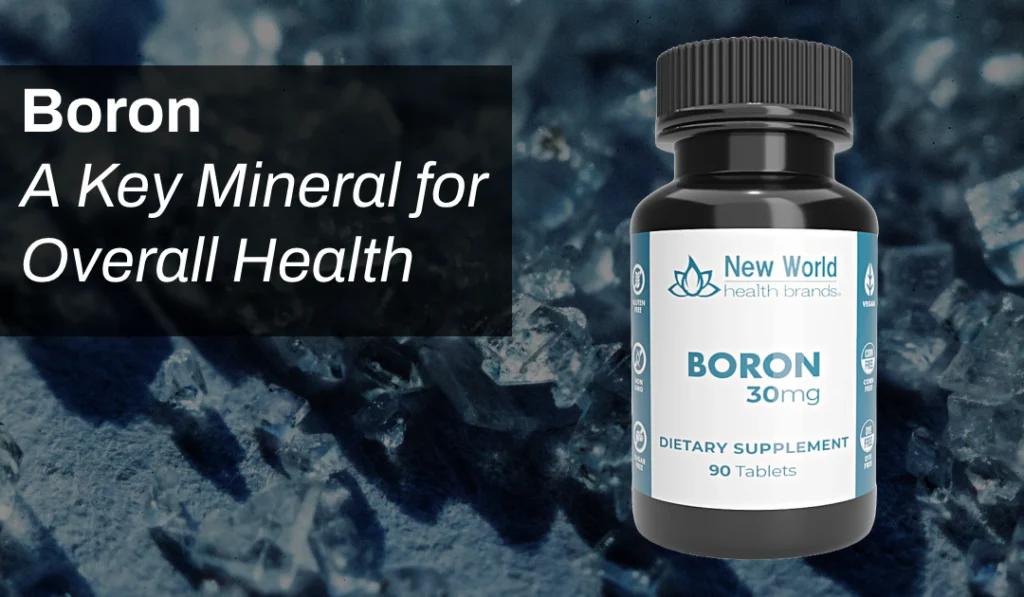Health and Wellness
Boron: A Critical Mineral for Overall Health
Boron is a trace mineral that, despite its minimal presence in the body, plays a vital role in our overall health. Often overlooked in discussions about nutrition, it supports a variety of biological functions, from improving bone density to enhancing cognitive performance. In this blog post, we delve into the key benefits of boron, highlighting why this nutrient deserves a spot in your dietary plan. Found naturally in the environment, it is present in everything from soil and water to fruits and vegetables.
Despite its widespread availability, boron doesn’t always get the attention it merits in the nutrient pantheon. This underappreciation might stem from the fact that the human body requires only a small amount of it. Yet, this trace mineral is crucial for optimizing health, influencing everything from the way our cells grow to how our body manages essential hormones. As we explore the multifaceted roles of boron, it becomes clear that even the smallest players in our diet can have substantial impacts on our health and wellbeing.
Boron Enhances Bone Health
One of the most significant benefits of boron is its impact on bone strength and structure. it helps regulate the metabolism of minerals that are pivotal for bone growth, such as calcium, magnesium, and phosphorus. By facilitating the absorption and utilization of these minerals, boron plays a crucial role in preventing bone diseases such as osteoporosis. Studies have shown that it supplementation can increase bone density and reduce the risk of bone fractures, making it an essential mineral for maintaining skeletal health, especially in older adults. Incorporating it into your diet through foods like nuts, fruits, and green leafy vegetables, or considering a boron supplement, can be a proactive step toward robust bone health.
Boosts Hormonal Balance
Boron’s influence extends beyond bone health; it is also vital for maintaining hormonal balance within the body. This trace mineral is known to significantly impact the body’s use of estrogen and testosterone, hormones that play critical roles in reproductive health and overall well-being. In men, adequate boron levels are associated with increased testosterone production, which can enhance muscle mass, improve strength, and potentially boost libido. For women, it can help alleviate symptoms associated with menopause and menstrual cycles by stabilizing the hormones that fluctuate during these periods. Furthermore, boron’s ability to stabilize hormones also makes it a contender in preventing hormone-related conditions such as prostate cancer.
Boron Supports Cognitive Function
The benefits of boron also extend to cognitive performance. This mineral helps enhance brain function and improve cognitive abilities. Research suggests that it aids in brain activity by supporting tasks involving motor control, attention, and short-term memory. It is believed that it helps maintain cellular membrane function and stability, which is crucial for mental acuity and cognitive processes. Additionally, a diet supplemented with adequate boron has been linked to improved concentration, better motor coordination, and enhanced memory retention. Ensuring sufficient intake of it could be particularly beneficial as we age, potentially helping ward off age-related cognitive decline.
Although only required in small amounts, it is a powerhouse mineral with wide-ranging benefits for bone health, hormonal balance, and cognitive function. Its role in enhancing life quality and preventing various health conditions, such as arthritis and vitamin D deficiency, makes it an essential component of a balanced diet. As with any supplement, it’s important to consult with a healthcare provider before starting boron supplementation, especially to determine the right dosage and ensure it fits into your overall health plan, complementing other treatments and dietary needs.
By acknowledging and incorporating this trace mineral into your diet, you can tap into its myriad health benefits and contribute to your body’s long-term well-being.


